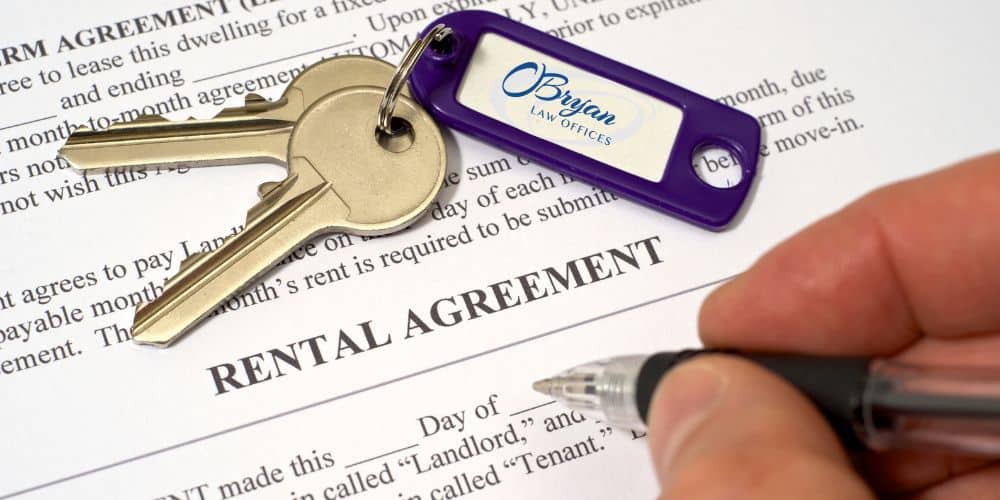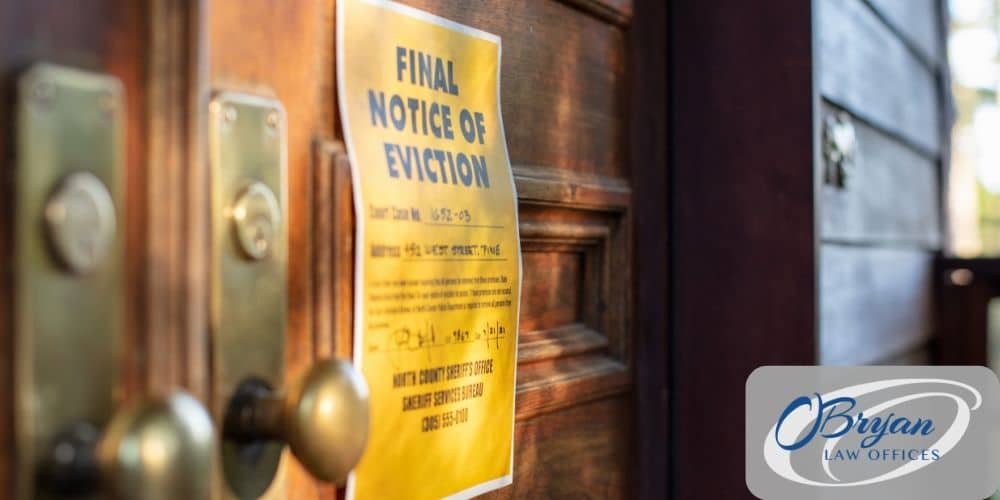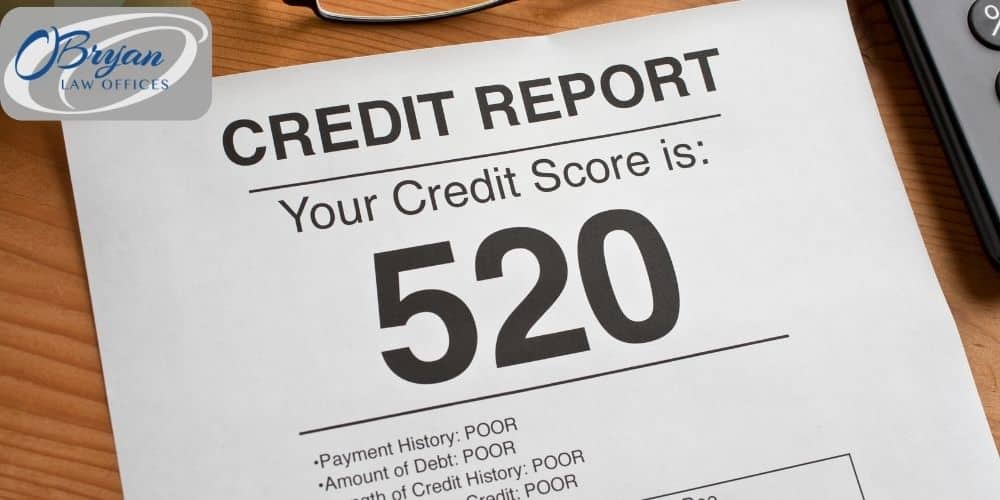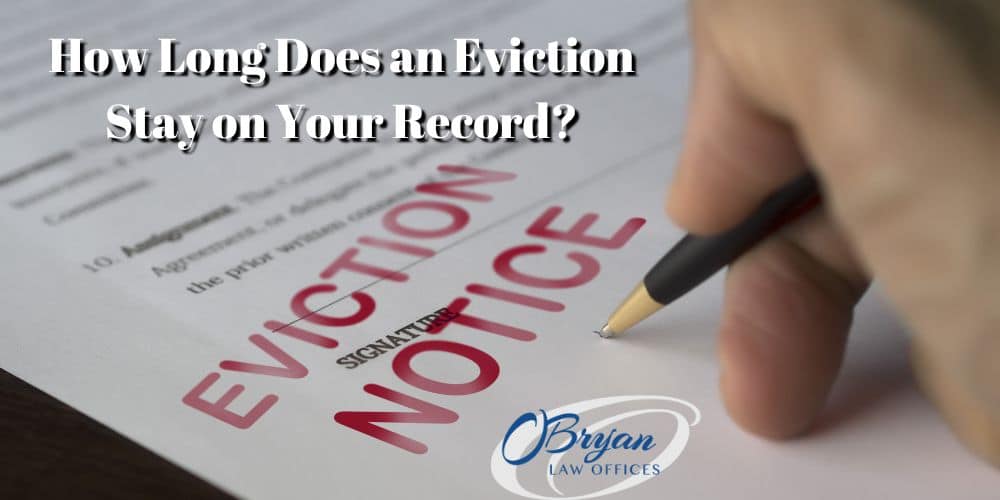Table of Contents
Coming home to an eviction notice posted on your door is devastating. Losing your home can mean more stress and uncertainty on top of your other struggles. Job layoffs, sickness, or a car accident can mean falling behind on bills. An eviction record can impact many aspects of life, including credit scores and applications for a new apartment. It can be difficult to get an eviction off your record, but it’s not impossible. So how long does an eviction stay on your record? The short answer is seven years, but some factors can change this.
The Kentucky debt counseling attorneys at the O’Bryan Law Offices can help you. We’ll answer some common questions about evictions and some steps you can take to avoid eviction or get an eviction expunged. If you have any questions about your specific case, feel free to call us today at (502) 400-4020.
Does an Eviction Show On Your Credit Report?
This question can be a tricky one. The eviction itself may not appear on credit reports, but any unpaid debt (like unpaid rent) can appear on your credit report if your previous landlord sold the debt to a collection agency. Most collection agencies report to the three major credit bureaus (Equifax, Experian, and TransUnion).
These unpaid debts will show up as collections on your credit report. This can negatively impact your credit score. When your landlord sells your debts to a collection agency, they often call non-stop to get payments from you. You probably already know the extent of your financial troubles; you don’t need creditors constantly calling to remind you. At the O’Bryan Law Offices, we can help stop creditor harassment.
Can You Rent With an Eviction on Your Record?

Having an eviction on your rental history is never a good thing. An eviction makes you look like a risky tenant to any future landlords, and many may deny your rental applications. Most landlords and property managers require a good credit score to prove that you are a reliable tenant. Having an eviction on your record can be a major red flag and make it difficult to find a rental that meets your needs.
Evictions stay on your record for seven years, but many people are not the same person they were seven years ago. If you have an eviction on your record and are trying to rent a new place, follow the tips below to boost your chances.
Be Honest
Let your prospective landlord or property manager know the details of your eviction, especially if you have resolved everything with your previous landlord. Your credit history and tenant screening report only show your situation’s objective facts, which often don’t paint the whole picture.
Get a Cosigner
Sign the rental agreement with a cosigner. A cosigner can make a new landlord feel a little more confident that they will get their rental payments. A cosigner will be responsible for rent payments if you, for some reason, fail to pay rent on time.
Pay Upfront
Be prepared to pay a higher security deposit. If it’s financially possible for you, offer to pay multiple months’ rent upfront.
Build Your Credit
In the meantime, work on restoring your credit. On-time payment history and consistent access to credit can show that you are a responsible tenant, no matter what your record says.
How Long Does an Eviction Stay On Your Rental History Record?

Most tenant screening reports will show a previous eviction for at least seven years. Having an eviction judgment on your rental history report can make it extremely difficult to rent anywhere. Getting an eviction removed from your public records can be an extensive task, but it can be done. Make amends with your previous landlord. Pay any back rent and any fees associated with getting the apartment ready for a new tenant.
This can prevent your landlord from selling your debt to a collection agency, but make sure to get any payment agreements in writing. After paying back the landlord, you can ask them to remove the eviction record from tenant screening companies. This should allow you to rent a little easier in the future.
Can You Dispute an Eviction With the Credit Bureaus?

Credit bureaus do not report evictions, so you will not be able to dispute them. If you have a collection on your credit report, you can dispute the collection and have it removed. This can be a complex process. Paying the collection debt will not change your credit score or remove the collection from your credit report. Paying the debt will simply close the account with the debt collector. The collection account will still be visible on your credit report, which means your credit score will be significantly lower than it could be for up to seven years.
How to Remove a Civil Judgment From a Credit Report
Civil judgments no longer appear on credit reports from a credit bureau. The three major credit bureaus stopped reporting civil judgments in 2017. If your landlord wins an eviction judgment in civil court, it often has to stay on your public record for seven years.
How to Avoid Eviction

59% of Americans live paycheck to paycheck, which means that many people are one month away from homelessness. Losing your home can be the result of several different factors. Avoiding eviction isn’t as simple as saying, “pay your rent on time.” While many tenants are evicted due to unpaid rent, that is often not the whole story. Fortunately, some options are available to help you avoid eviction.
Fight the Eviction in Court
You can dispute an eviction in court before it’s published on your record. An eviction notice is not the end of the case. The eviction process has proper procedures regarding how the eviction case can proceed. In Kentucky, this process includes a written notice and a legal cause for eviction. Evictions for unpaid rent require a 7-day notice to the tenant to allow them to avoid eviction. If the rent is not paid within 7 days, the landlord can file an eviction lawsuit.
If the eviction is due to some kind of lease agreement violation, the tenant has 14 days to fix the violation. On the 15th day, the property owners can file suit against the tenant. You can fight the eviction suit if the landlord fails to provide these written notices or does not have a legal cause for eviction.
Payment Plan
In some cases, a landlord may let you set up a payment plan for the past-due rent. Be honest with your landlord about what’s happening in your life, and they may be able to help. Evictions require a lot of paperwork and fees, so your landlord probably wants to avoid court as much as you do.
Bankruptcy
Bankruptcy is a debt relief option to help you get your life back on track. Many myths surround bankruptcy, so many are hesitant to even consider it. Bankruptcy puts an immediate stop on wage garnishments and lawsuits, including an eviction suit. Rent is an unsecured debt, which means late rent payments can be discharged when filing bankruptcy. The O’Bryan Law Offices is a family-owned and family-focused law firm. We know how financial struggles can bleed into every aspect of your life and cause undue stress and unhappiness. Let us help you!
Kentucky Credit Counseling Lawyers Are Here to Help
At the O’Bryan Law Offices, we know that life doesn’t always work out the way we want it to. Luckily for you, we have a team of Kentucky credit counseling attorneys that are ready to help you. We can help with every financial problem you may have, from debt consolidation to estate planning. For more information about our services, call us today at (502) 400-4020.








